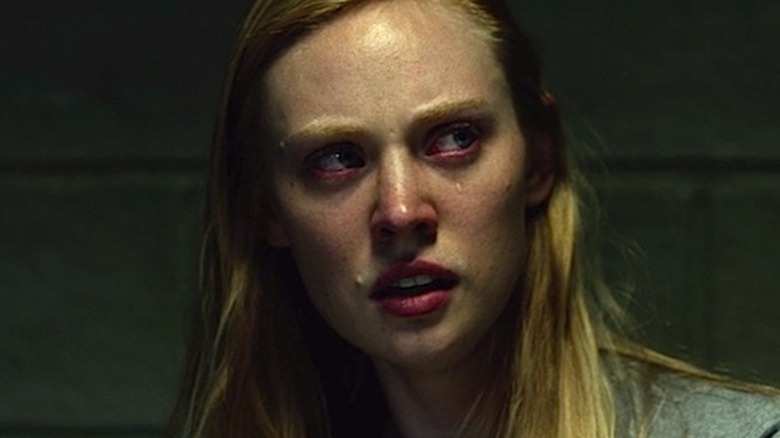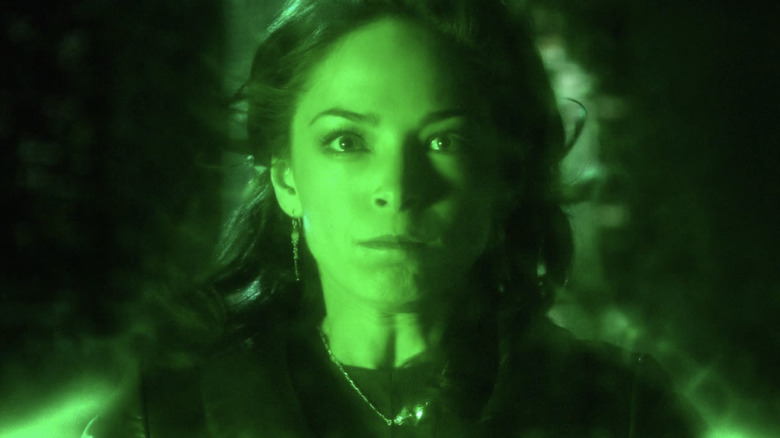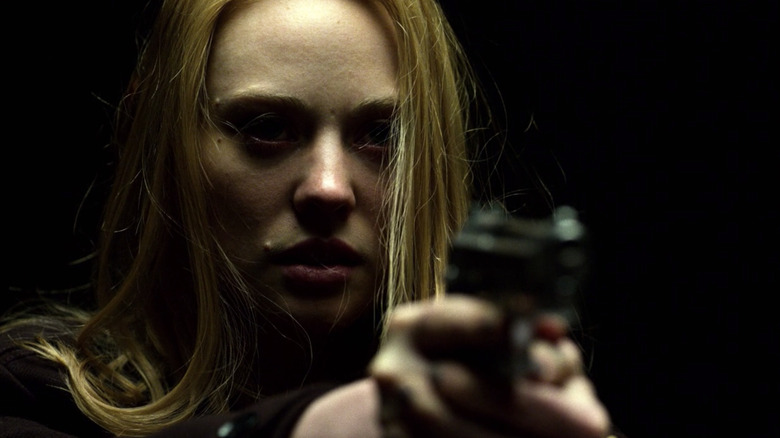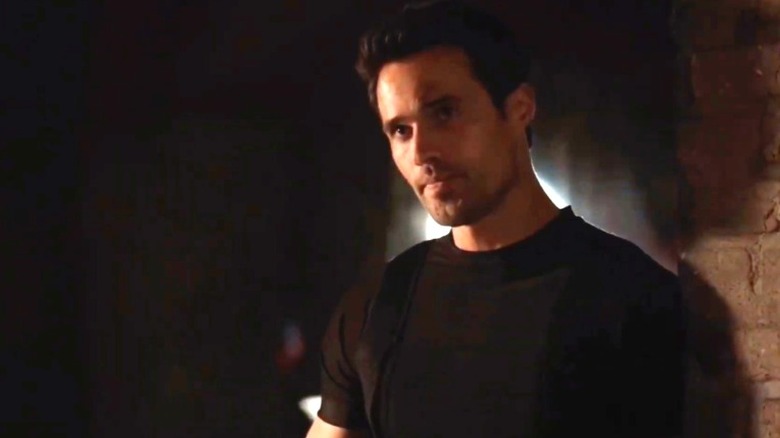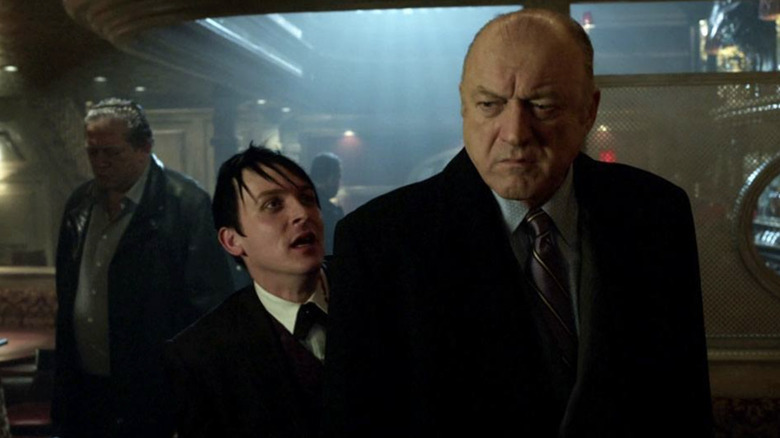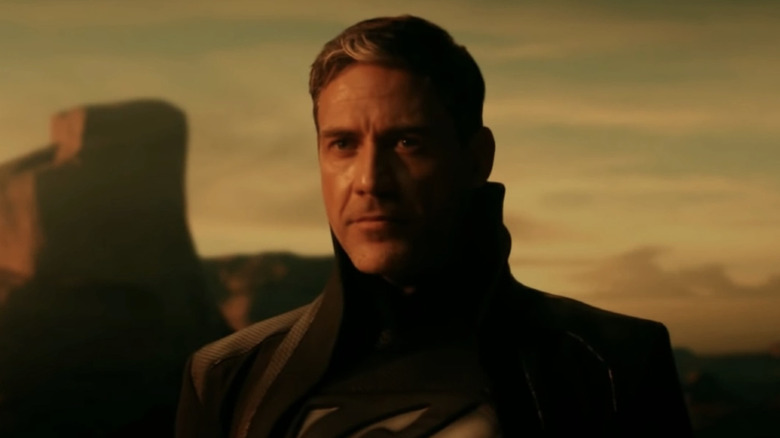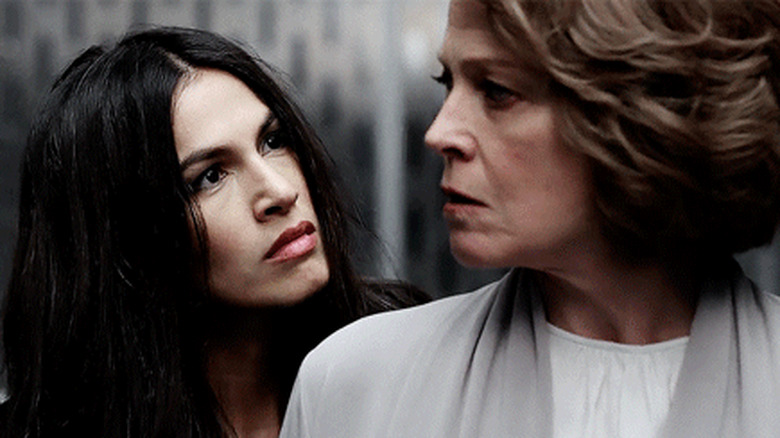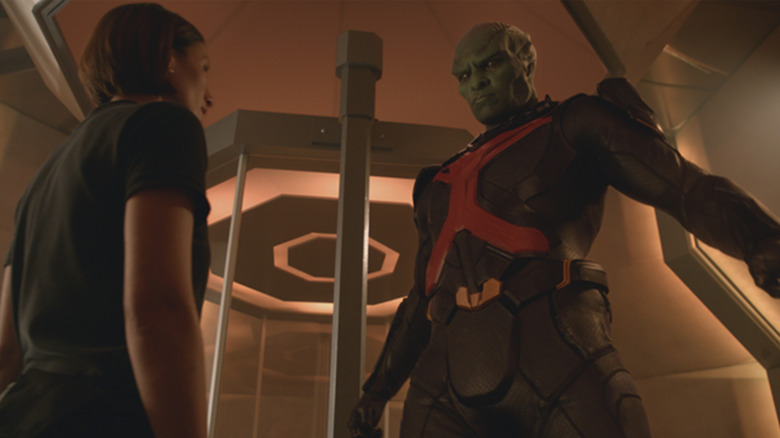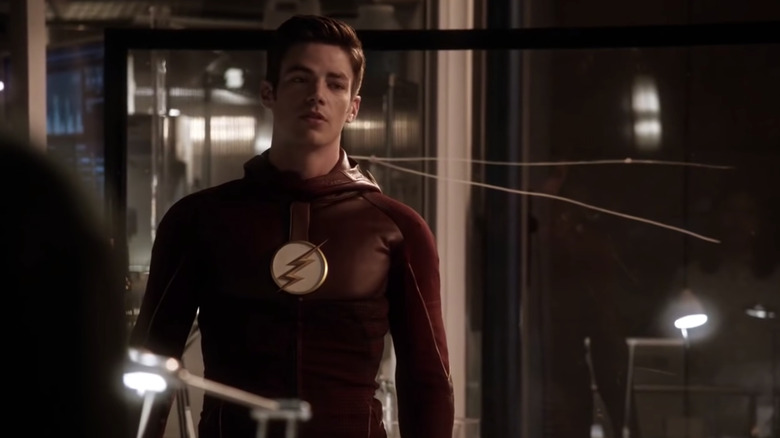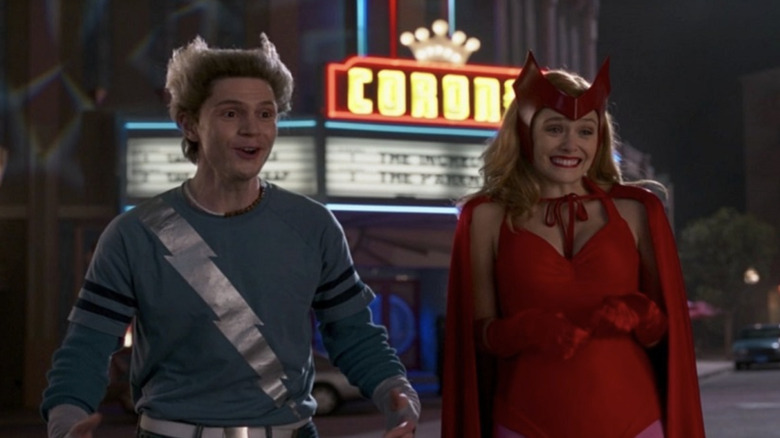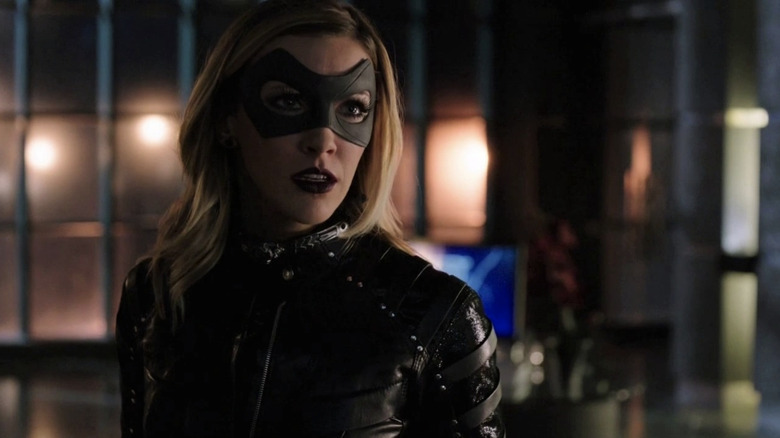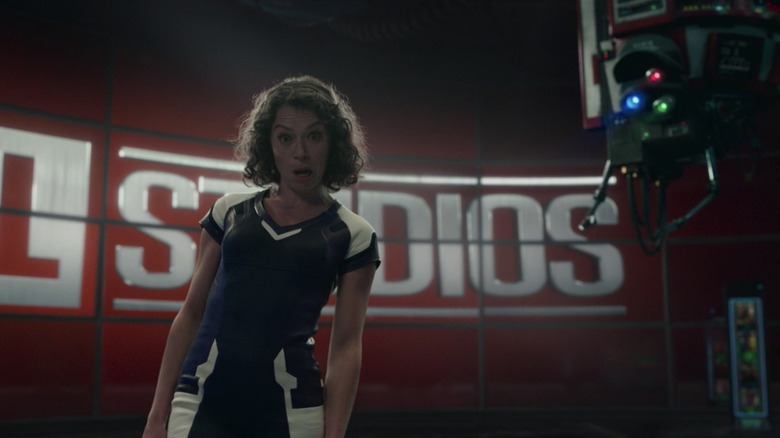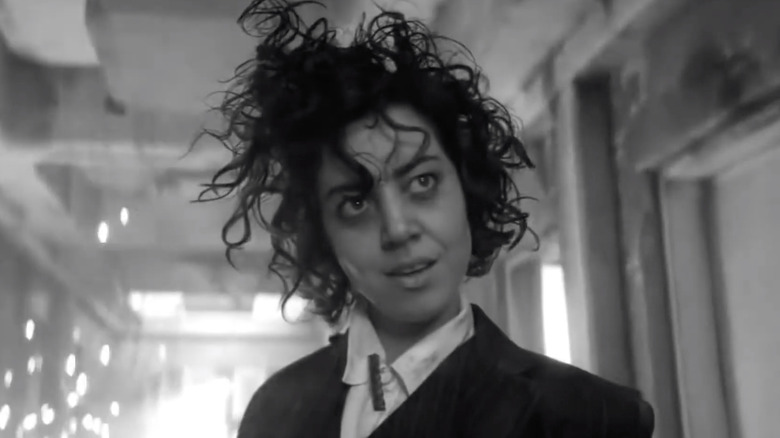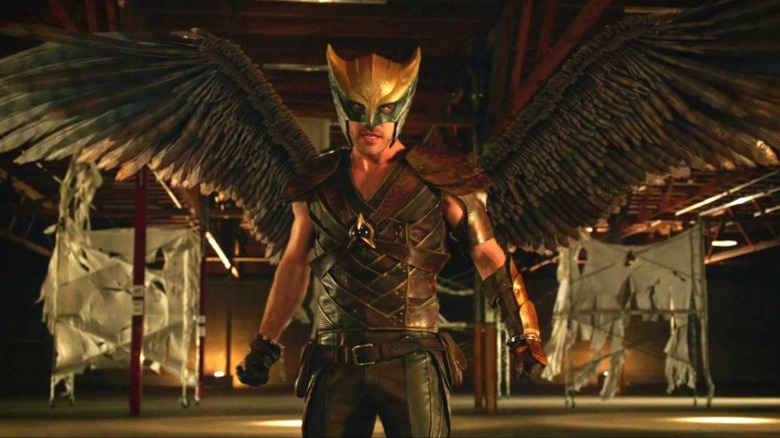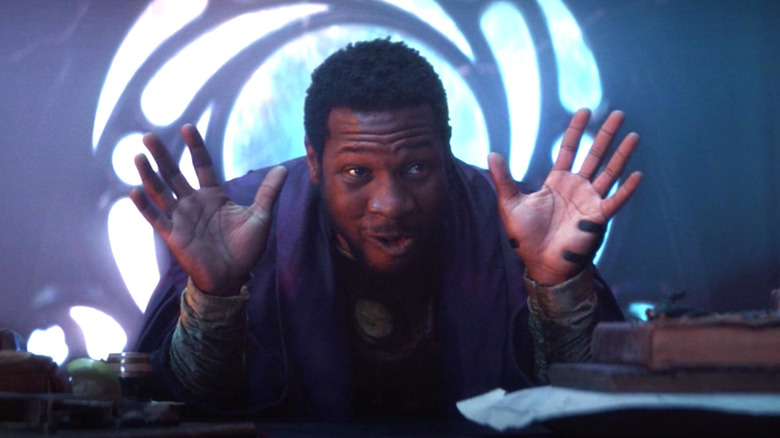Plot Twists We Never Saw Coming In Superhero TV Shows
We're living in a golden age of superhero media where our favorite characters are living far beyond the confines of their respective comic book universes. Between multiple feature films, television shows, animated material, and video games, there's a version of DC and Marvel's superheroes for everyone. No longer are characters like Batman, Superman, and Spider-Man bound to just one incarnation at any given time; now there can be several operating at once across different mediums — especially television.
Since the dawn of the 21st century, superhero television has only gotten more popular, with shows like "Smallville," "Daredevil," "Arrow," and "Legion," among a host of others, breaking through comic book barriers, igniting entire franchises, and tying into larger universes. It seems like, nowadays, even some of the most obscure comic book characters have their own shows. While many follow the already pre-written template of the classic comic book stories, others take their characters and worlds into completely new and interesting directions.
Whether you prefer superpowered aliens, blind vigilantes, speedsters, or time-travelers, there's a superhero show out there for just about everybody. Given some of the plot-twists that these writers come up with, they may very well keep you on your toes.
Smallville: Lana Lang gets kryptonite-based superpowers
The long-running WB-to-CW series "Smallville" is best known for reinterpreting Superman's origins in a post-9/11 world. Beginning with Clark Kent's (Tom Welling) high school years, the series graduates into young adulthood after Season 4 and launches itself even deeper into DC Comics mythos. Although Clark's high school love interest Lana Lang (Kristin Kreuk) traditionally drops off his romantic radar after high school, "Smallville" draws out the Clark and Lana romance for, to put it frankly, way too long.
When Kreuk departed the series alongside co-stars Michael Rosenbaum, John Glover, Laura Vandervoort, and series creators Al Gough and Miles Miller, fans thought they'd seen the last of Lana Lang, especially once Lois Lane (Erica Durance) becomes the apple of Clark's eye. However, Lana returns with a vengeance and steals a nanite supersuit meant for Lex Luthor, granting her superpowers that rival Clark's own. In the Season 8 episode "Requiem," to force Clark and Lana apart, Lex plants a kryptonite-laced bomb on the roof of the Daily Planet, revealing that Lana's newfound abilities also include the capacity to absorb all sorts of radiation ... including Kryptonite.
After saving Metropolis, and Clark, Lana's newly radiated cells began to kill the Man of Steel, leading to their final goodbye. Although this scene mirrors the early years of the series — especially the "Pilot" — well, no one saw it coming. Thankfully, Lana's absence led to Clark embracing his destiny as Superman and finding true love with Lois Lane.
Daredevil: Karen Page is a killer
The Netflix and Marvel co-production "Daredevil" is groundbreaking superhero television that launched a wave of Marvel-Netflix shows which culminate in the four-way crossover, "The Defenders." The first Marvel-Netflix series, "Daredevil" throws a few distinct plot twists at us, keeping us engaged and interested until the end. But one plot twist that we didn't see coming was the abduction of Karen Page (Deborah Ann Woll) by Wilson Fisk's (Vincent D'Onofrio) right-hand man James Wesley (Toby Leonard Moore).
In the episode "The Path of Righteousness," Wesley kidnaps Karen after learning that she has been digging into Fisk's past. After blackmailing her by threatening her friends at Nelson & Murdock, Wesley is interrupted by his ringing cellphone. This gives Karen the time she needs to take Wesley's gun, and in the heat of the moment, she kills him. But Karen doesn't just shoot Wesley once, she puts a few rounds in his chest before cleaning up the scene and escaping to live another day. It's a brutal, emotionally charged moment that haunts Karen for years to come.
Eventually, she comes clean to Fisk in the Season 3 episode "Upstairs/Downstairs," who would've had her killed if not for Daredevil's (Charlie Cox) intervention. Upon his defeat of the Kingpin in the series finale, Daredevil secures Karen's safety in exchange for the immunity of Fisk's wife Vanessa (Ayelet Zurer). Though Karen continues to struggle with her demons, the Devil of Hell's Kitchen remains her protector.
Agents of S.H.I.E.L.D.: Hail Hydra
Though the exact relationship between "Marvel's Agents of S.H.I.E.L.D." and the greater Marvel Cinematic Universe is a bit blurry, earlier seasons tie in heavily with most MCU movies post-"The Avengers." After sporting direct connections to both "Iron Man 3" and "Thor: The Dark World," the world of "Agents of S.H.I.E.L.D." was thrown for a loop with the release of "Captain America: The Winter Soldier." Only a few days after the film's release, the ABC series aired "Turn, Turn, Turn," which changes the entire trajectory of the show.
In conjunction with the events of "The Winter Soldier," other members of SHIELD reveal themselves as Hydra, forcing Phil Coulson (Clark Gregg) and his team into a state of distrust. Though at first it seems as if Coulson's team is free of Hydra influence, it's revealed at the end of the episode that Grant Ward (Brett Dalton) is an undercover agent after he breaks out his fellow Hydra operative and mentor John Garrett (Bill Paxton).
Though the rest of the team doesn't learn the truth for another two episodes, the reveal is both shocking and heartbreaking for fans, especially those who wanted to see Ward and Skye (Chloe Bennet) get together. Admittedly, other plot twists in this series are equally difficult to predict, such as the reveal that Skye is actually the Marvel Comics character Quake. But Ward's turn to the dark side shook things up more than most.
Gotham: Double-agent Oswald Cobblepot
Like "Smallville" before it, the hit Fox series "Gotham" takes the vast mythology of Batman and reinterprets the origins of the character for a new generation. Naturally, that reinterpretation extends to his supporting cast and rogues' gallery. Though not every Batman villain is well-adapted into the "Gotham" canon, Robin Lord Taylor's depiction of Oswald Cobblepot, aka the Penguin, might be the most well-rounded live action take on the character. (And that includes Colin Farrell's from "The Batman.")
In the "Pilot" episode, Penguin is a nobody working for career criminals such as Fish Mooney (Jada Pinkett Smith) and Carmine Falcone (John Doman) until Jim Gordon (Ben McKenzie) and Harvey Bullock (Donal Logue) are ordered to kill him. Rather than corrupt himself, Gordon lets Cobblepot go on the condition that he stay out of Gotham forever. Naturally, Penguin returns to the city and joins a rival gang, though all is not how it seems. In "Penguin's Umbrella," we learn that Cobblepot is actually a double agent for Falcone, who orchestrated the whole thing to get into his rival's camp.
Naturally, Penguin develops his own ideas about running Gotham, and by the end of Season 1 he starts a war between the rival crime families and kills Mooney in an attempt to become the biggest crime lord in Gotham. No doubt, Cobblepot's eventual role as a criminal mastermind was foreseen, but his status as Falcone's double agent came out of nowhere.
Superman & Lois: Morgan Edge is Superman's long-lost brother
Perhaps no twist in memory has so drastically changed the way a hero dealt with a villain than what's revealed in the first season of "Superman & Lois." Though the show follows Clark Kent (Tyler Hoechlin) and Lois Lane (Elizabeth Tulloch) as they raise their twin sons in Smallville, Kansas, the stakes quickly get higher as the villainous Morgan Edge (Adam Rayner) begins buying up the town and mining for X-Kryptonite, a rare form of the radioactive mineral that can give human beings superpowers.
At the end of the episode "Loyal Subjekts," Edge reveals to Superman that unlike his DC Comics counterpart, he is not human at all. In fact, he's a Kryptonian being named Tal-Rho, who just so happens to be his half-brother on his mother's side. In all the years of Superman comics, never has Kal-El had a biological brother in the mainstream continuity, making this plot twist one for the ages. Though Superman defeats Tal-Rho and has him imprisoned with the Department of Defense, he continues to look after him from afar.
While other series villains are left in the wind following their defeat, Superman's complex relationship with his own brother is a fascinating development that most iterations of the Man of Steel have never attempted.
The Defenders: Elektra kills Alexandra and takes over the Hand
Though many consider the Marvel-Netflix crossover miniseries "The Defenders" to be somewhat underwhelming compared to the breakout seasons of three of its standalone series — "Daredevil," "Jessica Jones," and "Luke Cage" — it throws us a few curveballs to keep us interested. One of these is the return of Elektra Natchios (Élodie Yung). Thought dead at the end of "Daredevil" Season 2, Elektra is resurrected by the Hand to further their goals of immortality.
The series also introduces us to Alexandra (Sigourney Weaver), one of the "five fingers of the Hand" who leads the group into the 21st century. As a mentor and mother-figure to Elektra, Alexandra manipulates her into killing her old mentor Stick (Scott Glenn) and kidnapping Danny Rand, aka the Iron Fist (Finn Jones), so that the Hand can use him to retrieve a magical elixir from the bones of a dragon. (Yeah, this show is sort of out there.) Though Elektra obeys, at the end of the episode "Ashes, Ashes," she suddenly murders Alexandra and takes her place as the head of the Hand.
Though we all assumed Alexandra would die by the end of the series – Sigourney Weaver's time is very expensive, after all – her murder at Elektra's hand before the finale is surprising to say the least, especially since Elektra just continues her dead mentor's plans anyway. Although, this act leads to a final heartbreaking moment between Daredevil and Elektra, which makes the journey worth it.
Supergirl: Hank Henshaw is actually the Martian Manhunter
Though "Supergirl" aired on the CW for the majority of its run, the superhero series originally premiered on CBS in 2015. Following a young adult Kara Danvers (Melissa Benoist) as she develops into a hero of her own, "Supergirl" partners up the title character with her newly created adoptive sister Alex (Chyler Leigh), best friend Winn (Jeremy Jordan), and Superman's pal Jimmy "James" Olsen (Mehcad Brooks). But maybe the breakout star of the series is David Harewood, who initially played DEO agent Hank Henshaw.
In the comics, Hank Henshaw is best known as the Superman and Green Lantern adversary Cyborg-Superman, a character created during the "Death and Return of Superman" arc in the mid-1990s. However, in the episode "Human for a Day," it's revealed that Harewood isn't playing Hank Henshaw at all, but rather an alien named J'onn J'onzz, aka the Martian Manhunter, a primary member of the Justice League. The reveal that the real Henshaw is dead while J'onn has taken his place swings "Supergirl" in a completely different direction as the series begins to deal with more and more issues surrounding other alien beings on Earth.
This was a smart move for the series, as the Martian Manhunter becomes a recurring member of the Arrowverse, fulfilling his comic book role of supporting mainstream heroes while serving humanity from the shadows. No doubt, the inclusion of J'onn J'onzz is the best twist in the series.
The Flash: Barry erases Diggle's daughter and changes history
From the very first season of "The Flash," Grant Gustin's Barry Allen tackles the complexities and consequences of time travel. His very first big bad, the Reverse-Flash known as Eobard Thawne (Tom Cavanagh), hails from the future and uses his own speed ability to change Barry's history and, in turn, rewrite reality. Although Barry knows the dangers of messing with time, he chooses to go back and save his mother from the Reverse-Flash anyway, creating a split in the timeline called a "Flashpoint."
In the Season 3 premiere also called "Flashpoint," Barry lives for months in this newly created world, only to realize that the timeline he created is worse than before. After resetting the timeline, Barry discovers that it's not exactly like it was before. In this world, Iris (Candice Patton) and her father Joe (Jesse L. Martin) don't talk to each other, Cisco's (Carlos Valdes) brother was killed, and he created an evil version of himself called Savitar. But, possibly worst of all, Barry's manipulation of time erased the daughter of John Diggle (David Ramsey); in this world, Diggle has a son instead.
Barry's actions cause lots of distrust among the Arrowverse's superhero community, and pit even his best friends against him. Thankfully, many of these differences are dealt with, and following the 2019-2020 "Crisis on Infinite Earths" crossover, a supernaturally powered Oliver Queen (Stephen Amell) restores Diggle's daughter alongside his son.
WandaVision: Quicksilver
Marvel Studios' first official venture into the world of television turned out to be a bit more than that. As a love letter to various eras of TV, "WandaVision" is a tragedy cleverly disguised as a comedy, and it works pretty well. As Wanda Maximoff (Elizabeth Olsen) fully embraces her powers as the Scarlet Witch, and Vision (Paul Bettany) learns of his own death, the mystery unravels itself nicely, leading into a climactic battle between witches as Wanda faces her nemesis Agatha Harkness (Kathryn Hahn).
Though Agatha's reveal as the one "behind it all along" (which isn't even exactly true) is certainly a big twist, a bigger swerve for superhero fans might be the return of Pietro Maximoff, aka Quicksilver. While Pietro first appears alongside Wanda in "Avengers: Age of Ultron," this version isn't played by Aaron Taylor-Johnson; instead, Evan Peters takes over after having played a different version of the same character in "X-Men: Days of Future Past" and its sequels. Seeing Peters as Quicksilver again, complete with a comics-accurate costume, was a delight, even if it all turns out to be a lie.
Once we find out Wanda's chaos magic has manipulated all of Westview, "Pietro" is revealed as nothing more than a brainwashed citizen named Ralph Bohner, who isn't even a speedster outside of Wanda's world of weird. While his appearance in "On a Very Special Episode..." was a welcomed surprise for fans, the reveal that he isn't actually the same character from Fox's "X-Men" movies brought to the MCU was a bit of a let-down.
Arrow: Killing Black Canary
In the first few seasons of "Arrow," fans assumed that Oliver Queen and Dinah Laurel Lance (Katie Cassidy) would end up together in the end. Their comic book counterparts, Green Arrow and Black Canary, have shared a long-standing romance and since the "Smallville" incarnation of Queen (Justin Hartley) fails to end up with his Black Canary (Alaina Huffman), many hoped that the new CW series would rectify that and stay true to the source material.
Well, after a season of teasing an impending death, in the heartbreaking Season 4 episode "Eleven-Fifty-Nine," Laurel is killed while acting as the Black Canary while trying to take down the season's big bad Damien Darhk (Neal McDonough). Though Team Arrow later avenges her death, Cassidy's departure is still a pretty big blow to the series. Having been a major part of "Arrow" since the beginning, any hopes of Oliver and Laurel ending up together are squashed by her sudden death.
As the series progresses, an alternate version of Laurel from a parallel universe makes her way onto the series, eventually taking over her doppelganger identity and helping the Green Arrow and his team in the fight to save their crime-ridden city. Though Oliver has the chance to resurrect some of his friends and family come the series finale, he chooses to keep Laurel's death intact, as it serves as a turning point in their conflict with Darhk. Plus, two Laurels might've been too confusing.
She-Hulk: Jen confronts Kevin Feige
"She-Hulk: Attorney at Law" is notable for taking a deconstructive approach to the Marvel Cinematic Universe and, maybe more importantly, for reintroducing Charlie Cox's Daredevil into the Marvel live-action continuity. But before She-Hulk's big climactic battle takes place, Jennifer Walters (Tatiana Maslany) hits pause on her own show.
In the series finale "Whose Show Is This?" Jen stops the action to confront the show's writers and asks them why her show has to end like every other Marvel Studios production. Unsatisfied with their answers, she confronts Marvel Studios head Kevin Feige himself ... sort of. Upon breaking into the Marvel Studios wing at the Walt Disney Company, Jen meets KEVIN, an A.I. tasked with creating every Marvel product there is — and possibly explaining why a lot of Marvel movies can feel more than a little formulaic. After some debate, Jen changes the ending of her series, and is ultimately satisfied with the results.
Whether you think this ending was lazy or clever — or maybe a bit of both — it was a plot twist that many didn't see coming, even after a whole season of She-Hulk breaking the fourth wall and directly addressing the audience.
Legion: That Shadow King reveal
Okay, so FX's "Legion" series isn't a superhero show in the strictest sense, but it mostly fits into the timeline of Fox's "X-Men" franchise. Following the son of Patrick Stewart's Charles Xavier (played by Harry Lloyd on the series), "Legion" chronicles the life of David Haller, aka Legion (Dan Stevens) as he learns to control his undefined mutant abilities, evade government capture, and battle sinister dark forces who threaten to control his power.
After David spends the majority of Season 1 confiding in and relying on his best friend Lenny Busker, played by the magnificent Aubrey Plaza, "Chapter 6" reveals that Lenny isn't his best friend after all. In fact, Lenny is actually the "Devil with Yellow Eyes" who has been after David this entire time, hoping to take his reality-warping powers for his own. Revealed to be the Marvel villain Shadow King, the evil mutant appears to David while essentially possessing Lenny on a number of occasions, hoping to convince him to give himself over.
While Lenny is eventually freed from the Shadow King's control, the villain — played primarily by Navid Negahban — continues to haunt David as he fights his own insanity. Needless to say, "Legion" is a strange show, and it only gets stranger the longer it continues.
Legends of Tomorrow: Hawkman's immediate death
The vast success of "Arrow" and "The Flash" led to another spin-off series that united some of fan-favorite heroes and villains from both shows. "DC's Legends of Tomorrow" continues plot threads from the "Heroes Join Forces" Arrowverse crossover as a group of misfits led by the Time Master Rip Hunter (Arthur Darvill) fight to stop the immortal Vandal Savage (Casper Crump) from remaking the world in his own image. Initially, Rip's ragtag group includes Savage's longtime enemies Carter Hall (Falk Hentschel) and Kendra Saunders (Ciara Renée), aka Hawkman and Hawkgirl.
In the "Pilot" episode, the Legends are conscripted into Rip's cause and begin hunting Savage through time in order to cripple his operation. By the end of "Pilot, Part 2," they counter the warlord himself. In a vicious battle with the Legends, Vandal Savage kills Hawkman with the only dagger that can kill the immortal tyrant. As it turns out, only the Hawks can wield it, and with Hawkman permanently down for the count, only Hawkgirl is left. To add insult to injury, Savage later brainwashes a future reincarnated version of Hawkman into his forces and uses him to hunt his own friends.
Although Hawkman meets his end in various comic book stories and even on "Smallville," his quick death at the start of "Legends of Tomorrow" set a tone for the series indicating that nobody is safe.
Loki: A Kang leads the TVA
Okay, so Loki (Tom Hiddleston) isn't exactly a superhero, nor is his series strictly a superhero series, but much like "Legion," his self-titled Marvel Studios show deserves a mention, especially considering the final twist. In the last episode, "For All Time. Always.," Loki and his female counterpart Sylvie (Sophia Di Martino) arrive at the end of time where they encounter the man behind the entire Time Variants Authority — an individual known only as He Who Remains (Jonathan Majors).
As He Who Remains explains that his own variants (including Kang the Conqueror) are exponentially worse, it becomes clear that the TVA is meant to safeguard the timeline from a multiversal war. As of the breaking of the multiverse as seen in "Spider-Man: No Way Home" and "Doctor Strange in the Multiverse of Madness," we better understand what He Who Remains is trying to prevent. Nevertheless, Sylvie kills the time-traveling tyrant and Loki is sent back to the TVA, who no longer recognize him. We can look back on this twist as the moment the Marvel Universe split open, and an endless number of possibilities — and alternate universes — are born.
